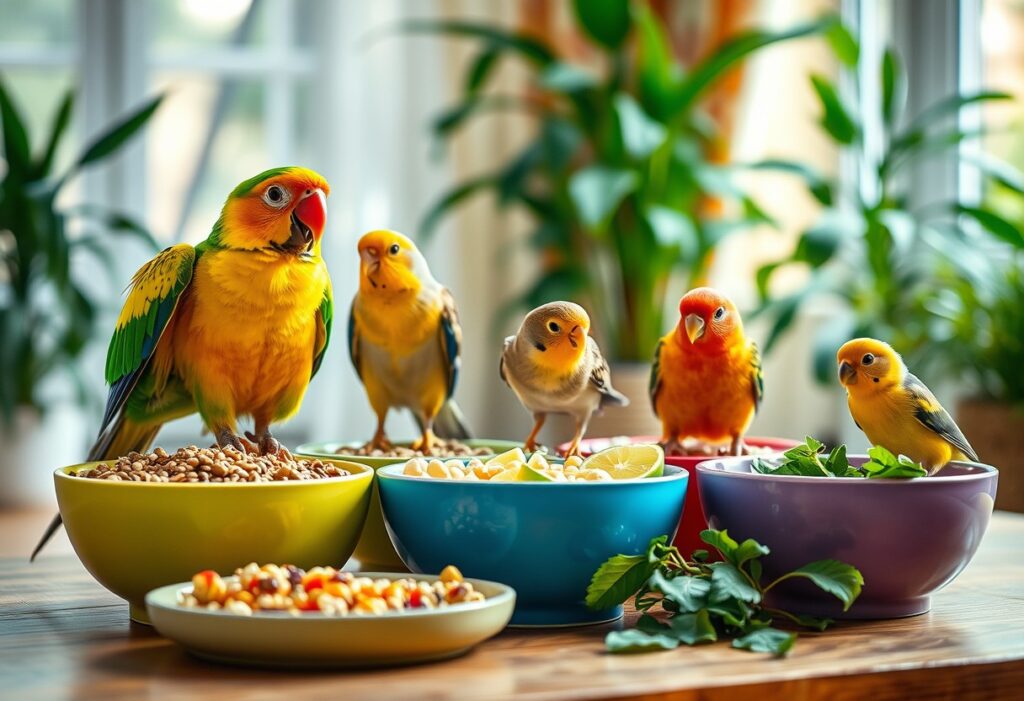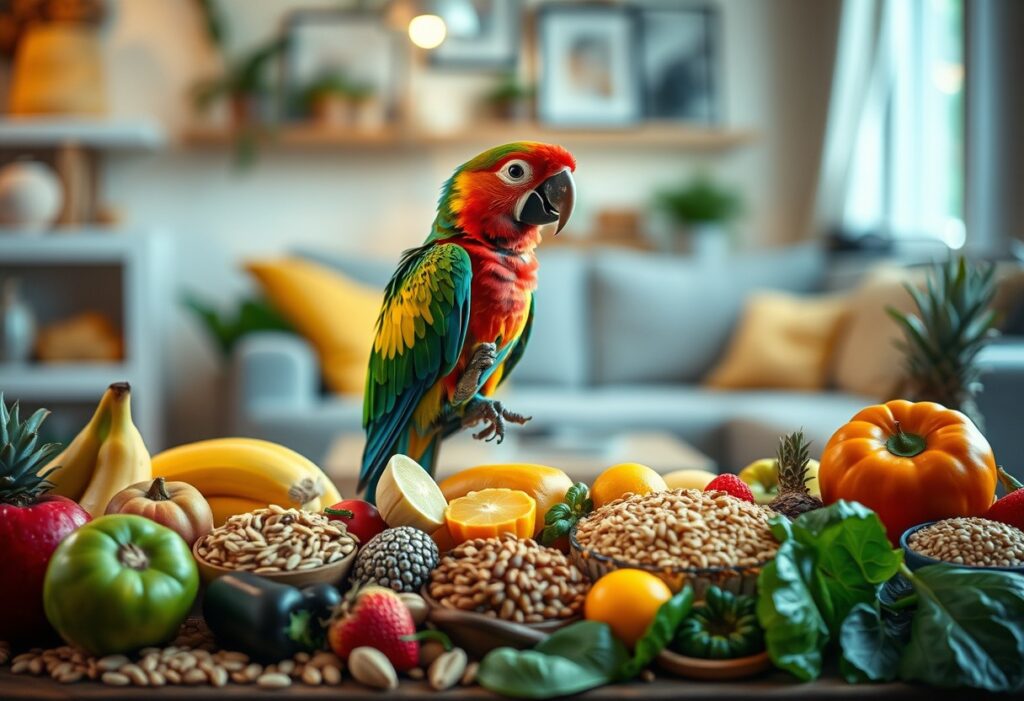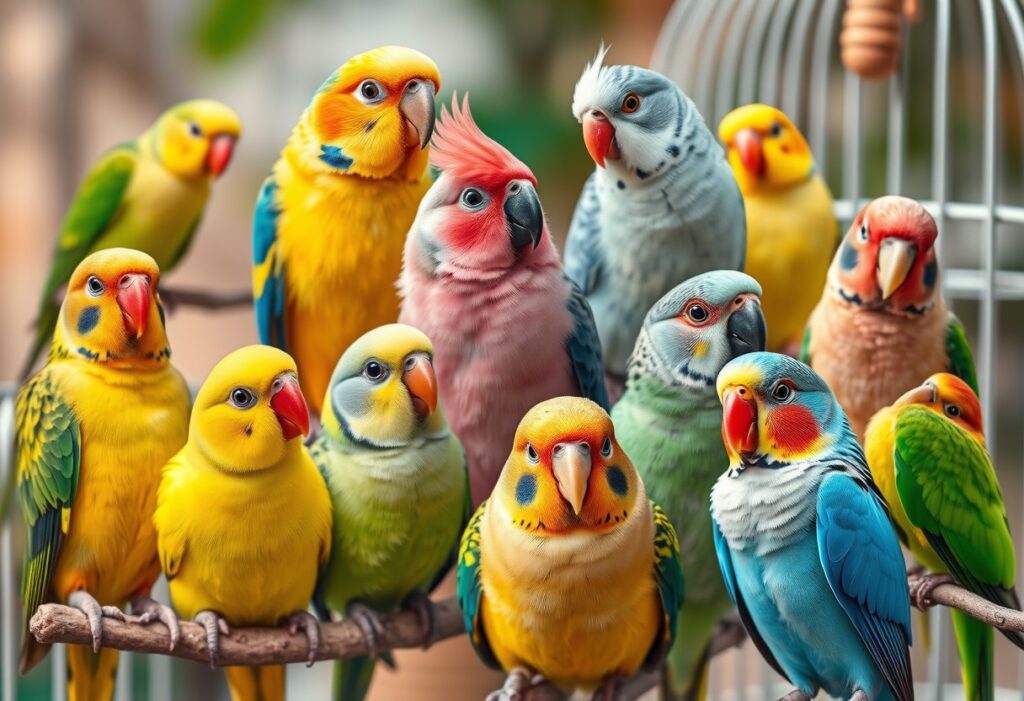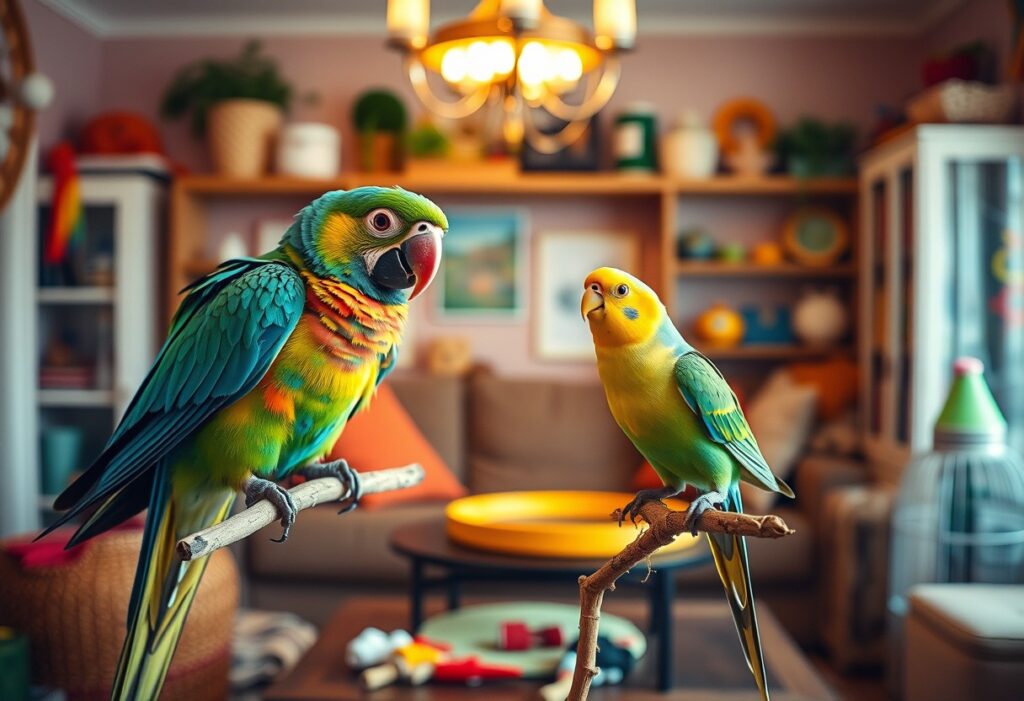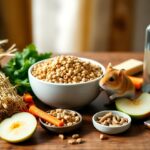Avian health is significantly influenced by the diet you provide for your feathered companions. Understanding that not all birds have the same nutritional needs is crucial for their well-being. Whether you own a vibrant parakeet, a graceful canary, or an intelligent macaw, it’s vital to tailor their diet to meet their specific requirements. In this post, you’ll discover the best dietary practices and recommendations for various types of pet birds, ensuring they thrive while avoiding potential health risks associated with improper feeding.
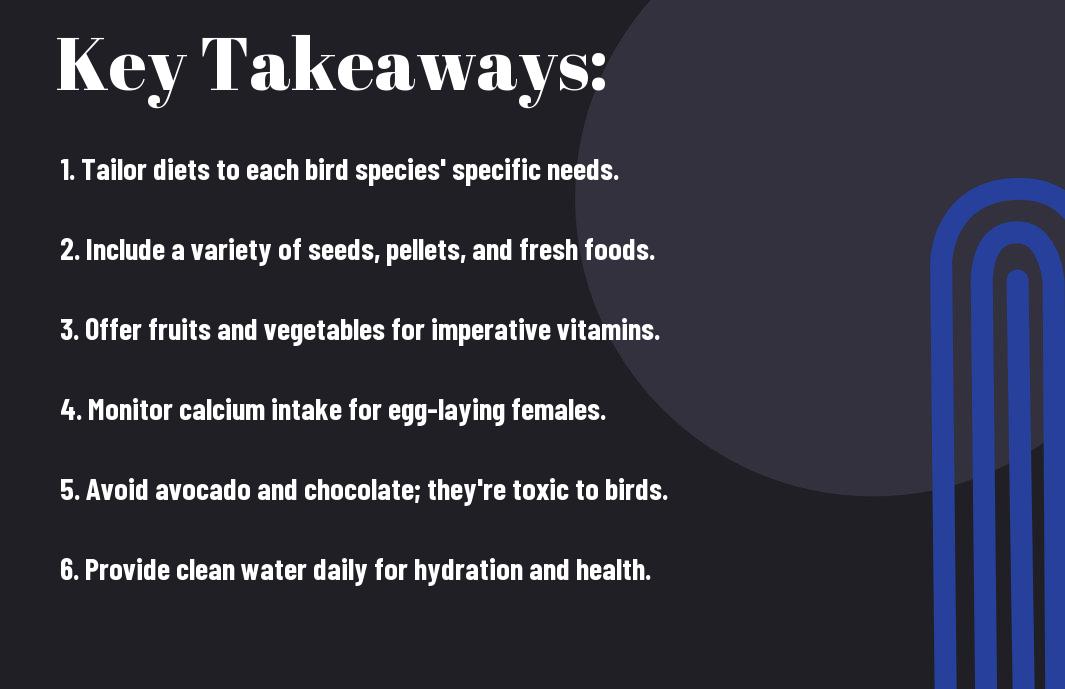
Understanding Bird Nutrition
For pet birds to thrive, it is crucial to comprehend the fundamentals of avian nutrition. Just like any other pet, your feathered friend requires a balanced diet that meets their specific nutritional needs. Unlike cats or dogs, birds are unique in their dietary requirements, which can vary significantly depending on their species. By ensuring that your bird receives the right nutrients, you promote not only their overall health but also their longevity and quality of life.
Essential Nutrients for Pet Birds
On the journey to provide optimal nutrition for your bird, it’s important to focus on the key nutrients that create a balanced diet. Seeds, fruits, vegetables, and pellets all play vital roles in your bird’s diet. For instance, seeds are a traditional staple; however, they are often high in fats and should be complemented with a mix of fresh fruits and vegetables to ensure your pet receives adequate vitamins and minerals. Additionally, commercial pellets designed for your bird’s species can serve as an important base in their diet, providing necessary nutrients that may be lacking from fresh foods alone.
Common Dietary Myths
Nutrients such as carbohydrates, proteins, fats, vitamins, and minerals are critical for your pet bird’s well-being, but there are many misconceptions around bird diets that can lead you astray. One common myth is that all seeds are sufficient for a bird’s diet. This belief can be extremely detrimental, as a seed-only diet can result in nutritional deficiencies. Another myth suggests that table scraps or human food are suitable for birds; however, many human foods can be toxic or harmful to your pet’s health.
A lack of knowledge about your bird’s specific dietary needs can lead to serious mistakes. Be wary of the notion that feeding birds only seeds or offering them just what you eat is adequate. This misunderstanding can contribute to health issues such as obesity, fatty liver disease, and even death. It is imperative to research and provide a varied and balanced diet that aligns firmly with your bird’s specific species requirements to ensure they live a healthy, vibrant life.
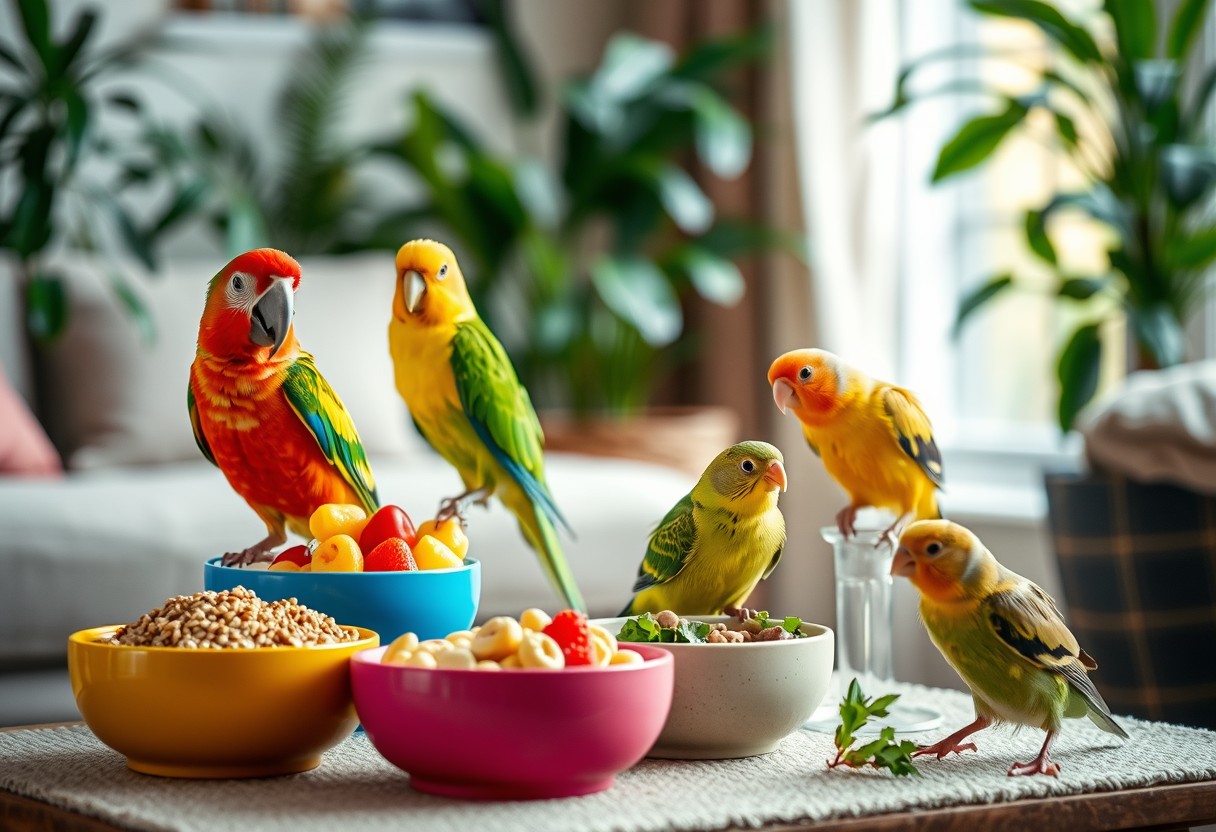
Diet Recommendations for Specific Bird Species
There’s no one-size-fits-all approach when it comes to feeding your feathered friends. Each bird species has unique nutritional needs that should be taken into consideration to ensure they lead healthy, vibrant lives. Here’s a breakdown of dietary recommendations tailored to some popular pet bird species.
Parakeets
An ideal diet for your parakeet includes a variety of seeds, fresh fruits, and vegetables. While seeds can serve as a staple, it’s important to offer a mix, which can help prevent certain health issues such as fatty liver disease. Supplementing their diet with leafy greens like kale and a small amount of fruit, such as apples or bananas, can provide important vitamins that may be lacking in seed mixes.
In addition to seeds and fresh produce, you should also consider providing your parakeet with quality pellets formulated specifically for their dietary needs. These pellets are often enriched with vitamins and minerals, ensuring your bird receives a balanced diet. Remember to change their food and water daily to keep them fresh and prevent bacteria growth.
Cockatiels
Species like cockatiels thrive on a combination of seeds, pellets, and fresh fruits and vegetables. Their diet should primarily consist of high-quality pellets that offer a balanced ratio of protein, carbohydrates, and fats. You can find specialized cockatiel pellets enriched with vitamins to ensure they stay in peak health.
Understanding the digestive system of your cockatiel is crucial as they benefit from a variety of foods. Along with pellets, you can incorporate fresh vegetables like carrots, broccoli, and even fruits like oranges and grapes, which can serve as treats to enrich their diet. However, be cautious not to overfeed fruits, as high sugar content can lead to obesity and other health issues.
Lovebirds
For lovebirds, a balanced diet should primarily focus on high-quality pellets supplemented with seeds, fresh fruits, and vegetables. Seeds mixed with pellets provide a good source of energy and important fatty acids necessary for their active lifestyles. A variety of fruits such as mango, berries, and veggies like bell peppers will keep them happy and healthy.
Bird owners should also note that lovebirds have strong social behaviors and playfulness, making it vital to engage them with their food as well. Try serving food in foraging toys or scattered around their cage to encourage natural behaviors. This not only keeps them mentally stimulated but also supports their physical health.
Canaries
For canaries, a diet rich in seeds, particularly canary grass seeds, forms the foundation of their nutrition. You can also provide them with a variety of smaller seeds, such as millet and oats, and supplement their diet with fresh veggies and fruits like carrots, spinach, and small pieces of apple. This can help prevent common health issues like obesity or feather plucking.
The best way to serve this diet is through a combination of seed, pellets, and fresh food daily. It is important you avoid sugary or fatty treats, as they can lead to unhealthy weight gain in canaries. Offering an occasional cuttlebone will help provide calcium and keep their beak conditioned.
Macaws
Diet diversity is crucial for macaws, who require a rich assortment of pellets, seeds, nuts, fruits, and vegetables. Macaws are known for their strong beaks, and nuts can offer them the necessary crunch they need while also being high in protein. However, due to their high-fat content, you should offer nuts in moderation to prevent obesity.
Another important aspect of your macaw’s diet is ensuring they have access to fresh, clean water daily. Fresh fruit and veggies not only keep their diets colorful and exciting but also provide important nutrients. Foods such as blueberries, mangoes, and dark leafy greens are excellent choices to keep your macaw healthy and satisfied.
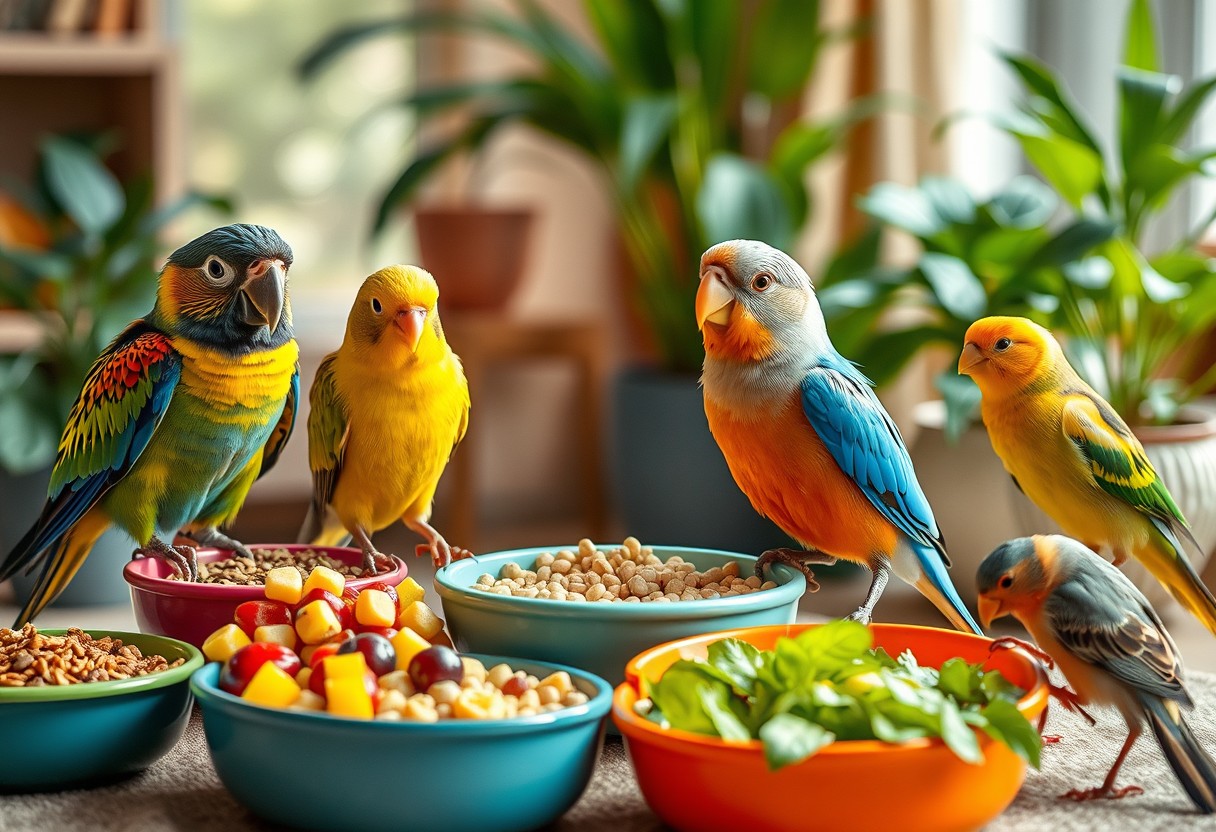
Appropriate Treats and Supplements
Despite a balanced diet being necessary, treats and supplements play a significant role in ensuring your pet bird remains healthy and happy. They can offer nutritional variety, promote engagement, and even serve as positive reinforcement during training. However, it’s crucial to select the right treats that align with your bird’s dietary needs, as some can be high in sugar or fat, leading to health issues if given excessively. Understanding what constitutes suitable treats and the appropriate supplements will help you provide the best care for your feathered friend.
Fresh Fruits and Vegetables
One of the best ways to enrich your bird’s diet is by incorporating fresh fruits and vegetables. These natural foods are packed with necessary vitamins, minerals, and antioxidants that support your bird’s overall health. You can offer a variety of options such as leafy greens, carrots, apples, and berries, ensuring that your bird receives a balanced intake of nutrients. Presenting these foods in different forms—like diced, shredded, or even as a whole—can keep mealtime exciting for your pet.
Additionally, it’s important to remember that not all fruits and vegetables are safe for birds. Always research and confirm which foods are safe for your specific bird species, as some may be harmful. Regularly offering fresh produce not only promotes better health but also encourages natural foraging behaviors, making for a well-rounded diet.
Seeds and Grains
Fruits and grains can be beneficial elements in your bird’s diet, providing necessary energy and variety. Regarding seeds and grains, integrating a mix can ensure your bird receives various nutrients. High-quality seeds, such as millet or canary seeds, can be part of a balanced diet, but they should never be the only source of food. Variety is key, and it’s advisable to supplement these foods with fresh produce and pellets, creating a more comprehensive nutritional plan.
Plus, be mindful of the proportions you’re offering. Overfeeding seeds can lead to obesity and vitamin deficiencies in birds, as most seeds are high in fat. Therefore, it is best to provide seeds in moderation, focusing on a primarily pellet-based diet supplemented with grains and seeds to maintain balanced nutrition.
Vitamins and Minerals
For your pet bird to thrive, ensuring they receive adequate vitamins and minerals is crucial. Regularly including vitamin and mineral supplements can help fill any nutritional gaps in your bird’s diet, particularly if they are picky eaters or have specific dietary needs. These supplements come in various forms, including powders, liquids, and treats, allowing you to easily find a suitable option for your bird.
Regular monitoring of your bird’s health is necessary, and if you notice any unusual behaviors or symptoms, it might indicate a need for supplementation. Always consult with your avian veterinarian before introducing any new vitamins or minerals to ensure they are safe and necessary for your bird’s health.
Minerals, such as calcium and phosphorus, are vital for bone health and reproductive functions, while others like iron and zinc support various metabolic processes. A well-rounded balance of vitamins and minerals is key to preventing deficiencies or health complications, reinforcing the importance of a diverse and nutritious diet for your feathered companion.
Summing up
The best diets for different types of pet birds require careful consideration of their specific nutritional needs. By understanding your bird’s species, size, and individual preferences, you can create a diet that promotes optimal health and well-being. Whether you have a finch that thrives on seeds, a parakeet that benefits from a balanced pellet diet, or a larger parrot that enjoys a variety of fruits and vegetables, it’s crucial to diversify their meals to ensure they receive all the necessary vitamins and minerals. Additionally, avoiding certain foods that are harmful to birds, such as avocado and chocolate, is important for their safety.
You hold the key to your bird’s health by being proactive and informed about their dietary requirements. Regularly consulting with an avian veterinarian can provide personalized guidance tailored to your pet’s unique needs. As you incorporate a mix of high-quality pellets, fresh produce, and occasional treats, you foster a more vibrant and longer life for your feathered companion. Bear in mind, a well-nourished bird is a happy bird, and your commitment to their diet is a vital step in being a responsible bird owner.
FAQ
Q: What are the key components of a balanced diet for pet birds?
A: A balanced diet for pet birds generally includes a variety of seeds, pellets, fruits, vegetables, and occasional treats. Seeds should not constitute the sole food source, as they lack important nutrients. Pellets provide a fortified alternative that can meet the nutritional needs of birds. Fresh fruits and vegetables, such as leafy greens, carrots, and berries, can offer vitamins and minerals that enhance their health. It’s important to tailor the diet to the specific species of bird, as different birds have unique dietary needs.
Q: How can I determine the specific dietary needs of my pet bird breed?
A: Each bird species has distinct dietary requirements based on their natural habitat and eating habits. To determine the dietary needs of your pet bird breed, it’s best to research their specific needs online or consult a veterinarian who specializes in avian care. You can also refer to resources provided by reputable bird organizations or avian nutritionists. Common pet birds like parrots, canaries, and budgerigars each have particular dietary preferences and restrictions that should be understood for optimal care.
Q: Are there any foods that are toxic to pet birds that I should avoid?
A: Yes, several foods are toxic to pet birds and should be strictly avoided. Common foods that are harmful include avocado, chocolate, caffeine, alcohol, and onion. Additionally, certain seeds, such as apple seeds, and other high-fat or high-sugar foods can pose health risks. It’s important to familiarize yourself with a list of toxic substances for your specific bird species and ensure that any food offered aligns with safe dietary practices. Always consult a veterinarian if you are uncertain about a particular food item.
